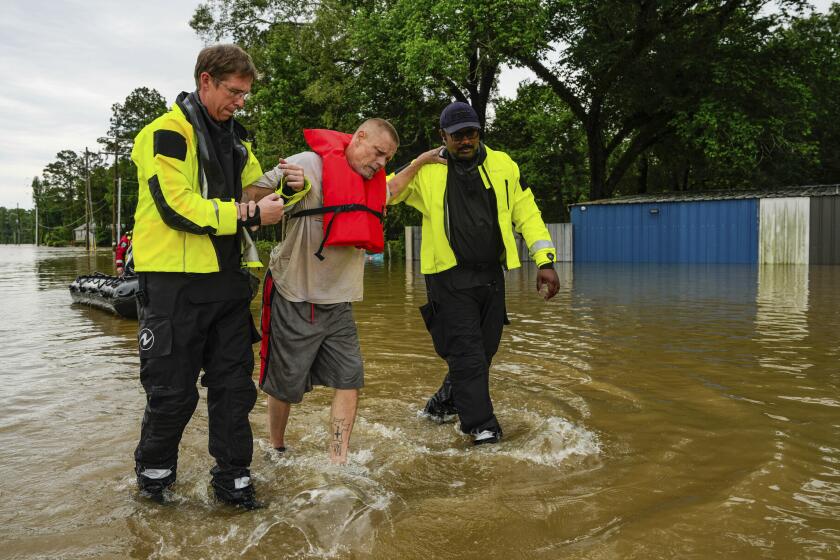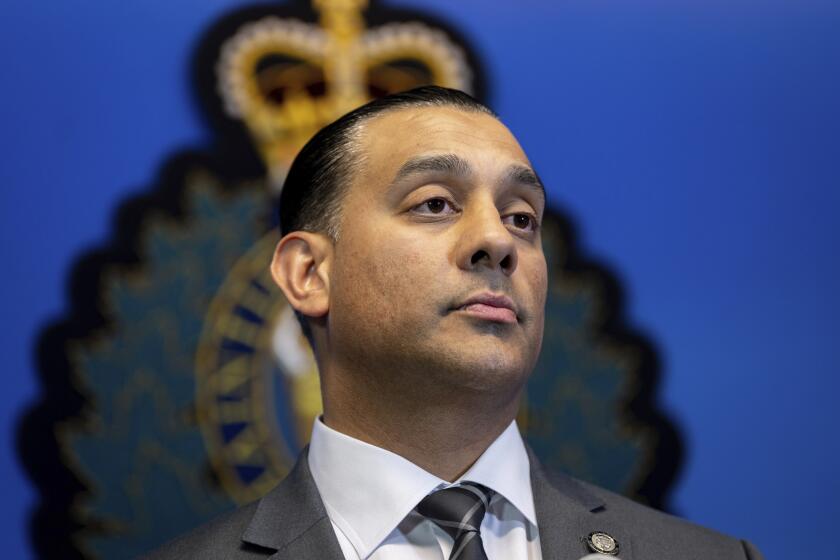Anger meets woe on road to funeral
Before being laid to rest Thursday in the dirt near his ancestral home, the body of Pierre Gemayel was borne on a surreal journey down through the villages of Mount Lebanon and into the heart of the capital, where it was greeted by hundreds of thousands of defiant Lebanese.
As dignitaries filled the church for the funeral of the assassinated Cabinet minister, demonstrators swarmed the streets and plazas of Beirut, toting flags and sporting their militia colors. They bellowed out cheers every time a speaker said the word “unity,” but the funeral of the Christian politician shot down Tuesday sketched a stark outline of a nation dangerously divided.
The demonstrators came with mostly dry eyes, but mouths full of obscene slogans against the Shiite Muslim group Hezbollah and its Syrian backers. There were Christians, Sunni Muslims and Druze infuriated by a string of killings of Lebanese politicians and journalists critical of the Syrian government in Damascus, which they believe is behind the slayings. “Syria’l killing regime,” read one of the posters outside the church.
The rowdy mourners cheered Gemayel as a martyr, and complained bitterly about Hezbollah.
“They want an Islamic state: Shiite, veiled, religious, feudal,” said Nadine Bekdash, 59, a gallery owner wearing Chanel sunglasses who bemoaned the power of Hezbollah chief Sheik Hassan Nasrallah. “He says something and everybody follows. I don’t believe one word of what he says.”
Meanwhile, fury was building among Shiites who heard the insults to their faith and their leader broadcast live on satellite television. When night fell, Shiite demonstrators took to the dark streets of south Beirut, setting fires and stopping cars in an apparent hunt for non-Shiites. The young men wore angry scowls. Leaders with walkie-talkies, a trademark Hezbollah tool, ordered them sharply not to talk with reporters.
The mood of vigilante rage on the streets provided a glimpse of long-festering tensions among religious sects and political parties, which seemed to have been inflamed anew by Gemayel’s assassination.
“They took advantage of the blood of their martyr,” said Nidal Almawla, a doctor and Hezbollah supporter who was holding court in his brother’s cellphone shop in a Beirut suburb. “Today their masks came off. They all belong to the United States.”
Gemayel was shot point-blank Tuesday as he drove through a crowded intersection on the Christian edge of the capital. His death struck a hard blow to Lebanon’s anti-Syria political forces. One of their young stars was snuffed out, leaving a Cabinet on the brink of collapsing should one more minister quit or die.
But instead of weakening the movement, the assassination appears to have galvanized sentiment against Syria and Hezbollah. The anti-Syria faithful were emboldened by a new sense of threat and their political leaders pledging with fresh determination to cling to power.
“Today we say this is our government: ... We won’t let it be replaced by a government of tutelage and crimes,” Samir Geagea, a former Christian militia leader and patriarchal leader, told the crowd gathered outside the funeral. “The fires of hell will not get this government.”
Days before Gemayel’s death, Hezbollah and its allies had quit the Cabinet, declared the government illegitimate and announced plans to stage mass demonstrations to force the anti-Syria politicians to give up some of their power. The charismatic Nasrallah told his people that the government was a meaningless puppet of U.S. interests.
But it was the remaining Cabinet ministers and their followers who went into the streets first, taunting Hezbollah. Instead of trying to defend themselves from the relentless criticisms leveled by the Shiite group, they charged out on the offensive by pledging to drive Syria-backed Lebanese President Emile Lahoud out of office.
“We want our revenge from Lahoud and Bashar!” screamed the crowd outside the church, referring to Syrian President Bashar Assad. “We want to go to Baabda!” they shouted, begging for a nod from their leaders to storm off to the presidential palace in the Beirut suburb.
Hezbollah is not expected to give up its push for a greater stake in the government. On Thursday, the party’s Al Manar television channel mocked the demonstrators’ claim to represent the national majority. Hezbollah could still stage protests to display their sheer numbers.
After his son’s funeral, former President Amin Gemayel, pale and somber, climbed onto a small stage to address the crowd from behind bulletproof glass. As he stood before the yelling masses, his face turned red, and he gave way to tears.
Lebanon would soon have a new president, Gemayel promised, and an international court would hold trials to punish those responsible for the assassinations. “We won’t rest until we bring justice to all those who committed the crimes against our loved ones,” he said.
Less than two years ago, after former Prime Minister Rafik Hariri was assassinated, many of the same people flooded the streets and staged sit-ins through cold nights and rainy days to demand an end to Syrian control over Lebanon. There was a strong sense of unity then, and eventually a feeling of empowerment as they witnessed the withdrawal of Syrian troops.
Now their confidence is shaken; apprehension is palpable. Followers of the anti-Syria politicians are grappling to understand the rise of both Iran and Hezbollah. They are exhausted after the pounding the Lebanese people took during the summertime war between Hezbollah and Israel, and uncertain about what comes next.
Many of them -- men and women, young and old -- said unbidden that they were willing to die.
“If Hezbollah and Syria continue like this, we may be required to die,” said Jalal Abdullah, an Internet cafe owner who had driven to Beirut from his village near the Israeli border. “What are they telling us, that there are only Shiites in this country?”
Abdullah, a Sunni Muslim, lives near the disputed Shabaa Farms area, in a stretch of villages dominated by Hezbollah. He complained angrily that the powerful Shiite party had failed to extend its charity and welfare service to Sunnis after this summer’s war, and that its followers had once removed the tires from his car to prevent him from traveling to a political rally in Beirut.
“They don’t want anybody in Lebanon to have a greater power than Hezbollah,” he said. “They want us all to be servants to Syria.”
Long before the coffin reached St. George’s Cathedral, an almost festive atmosphere gripped the packed streets outside. Young men clambered up metal grates over shop windows across the street to get a better look into the old stone church.
Dignitaries pulled up in sleek limousines flanked by dark SUVs full of bodyguards. People screamed and pushed like teenagers at a rock concert.
When political opponents such as Shiite lawmaker Hassan Khalil arrived, the crowd roared with boos and curses against Syria. When their own leaders stepped into view, the people erupted in whistles and cheers.
Then Gemayel’s body arrived, his coffin resting on the upturned hands of jostling young men. The pallbearers were too many to count; they wrestled for a place to press their palms to the wood. The box was draped in an enormous militia flag of the Falangists, the Gemayel family’s party. A smaller flag of Lebanon was tacked on top of that.
At 34, Gemayel died young, so in keeping with tradition, his funeral was treated like a wedding. In villages along the way, the men took the coffin upon their shoulders and danced.
With a crack of snare, the military band struck up a song called “Let Us Cry.” The silver trombones and trumpets flashed. The crowd tossed handfuls of rice onto the coffin.
Mourners were so tightly packed that it sometimes seemed possible to lift one’s feet off the ground and get carried along. People grew sick and stumbled, but there was no way to shove to the edge of the crush of sweaty bodies.
It sounded like raindrops beginning to fall furiously, but it was just the applause of the crowd. A riot of church bells filled the air. Helicopters circled overhead. Gunmen stalked the rooftops. From the speakers pumped Lebanon’s patriotic anthems, cranked up to painful volume: “We’re heading toward freedom,” the singer said. “We’re heading toward the sun.”
But in the hours after the funeral, anger swept the city. A Shiite gang massed outside a Sunni mosque in a southern suburb, throwing rocks at the windows and banging at the bars of the gate. Their voices melded into an indistinguishable holler.
Then from the neighborhood behind the mosque, a Sunni gang came racing out of the shadows toward the Shiites, brandishing pieces of lumber and rocks. “God, Hariri and Tariq al Jedidi,” they screamed, naming their patriarchal leader -- Saad Hariri, son of the slain ex-prime minister -- and their neighborhood.
The Shiites jumped onto mopeds and melted into the night. The army deployed with tanks to guard the seams between neighborhoods of different sects.
*
More to Read
Start your day right
Sign up for Essential California for news, features and recommendations from the L.A. Times and beyond in your inbox six days a week.
You may occasionally receive promotional content from the Los Angeles Times.






